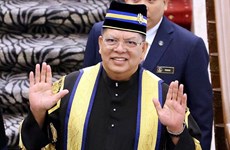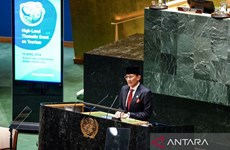ASEAN speeds up building of economic community
Establishment of the ASEAN Economic
Community is the main topic of the 41 st ASEAN Economic Ministers’
Meeting being held in Bangkok.
Establishment of the ASEAN Economic
Community is the main topic of the 41st ASEAN Economic Ministers’
Meeting being held in Bangkok, Thailand, from August 13-16.
For the Association of Southeast Asian Nations (ASEAN) to realise this goal by 2015, the participants proposed the formation of a common market in order to facilitate the flow of goods, services, capital and skilled workers within the region.
The bloc was urged to remove all tariff and non-tariff barriers, complete legal frameworks for regulations on the origin of goods and set up an ASEAN Single Window for the implementation of the “one-stop” policy in import-export activities.
The delegates emphasised the need to reduce obstacles for businesses that are operating in the service industry and increase choices for customers, with priority given to the tourism, aviation, healthcare and telecom sectors.
In a move to promote the liberation of investment, the Association worked out an ASEAN Comprehensive Investment Agreement (ACIA) to replace the 1998 Agreement on ASEAN Investment Area (AIA) and the Agreement on Investment Encouragement and Protection signed in 1987, the meeting heard.
The newly-built pact will focus on protection, cooperation and facilitation, promotion and liberation of investment, with the aim of improving ASEAN’s capacity in encouraging the flow of funds from both inside and outside the bloc.
Member countries will implement framework agreements, devised by the financial ministers, to develop capital markets and foster the circulation of capital sources.
Regarding employment, the ASEAN members will work together closely to put forth specific standards for skilled labour and create the best conditions for eligible skilled workers to work freely within the region.
To improve the competitive capacity of the ASEAN member countries, the participants suggested the making of supporting policies related to intellectual property, e-commerce, and the protection of consumers.
They also called for greater efforts to develop small- and medium-sized enterprises to ensure the balance of economic development and narrow the development gap among old and new ASEAN members./.
For the Association of Southeast Asian Nations (ASEAN) to realise this goal by 2015, the participants proposed the formation of a common market in order to facilitate the flow of goods, services, capital and skilled workers within the region.
The bloc was urged to remove all tariff and non-tariff barriers, complete legal frameworks for regulations on the origin of goods and set up an ASEAN Single Window for the implementation of the “one-stop” policy in import-export activities.
The delegates emphasised the need to reduce obstacles for businesses that are operating in the service industry and increase choices for customers, with priority given to the tourism, aviation, healthcare and telecom sectors.
In a move to promote the liberation of investment, the Association worked out an ASEAN Comprehensive Investment Agreement (ACIA) to replace the 1998 Agreement on ASEAN Investment Area (AIA) and the Agreement on Investment Encouragement and Protection signed in 1987, the meeting heard.
The newly-built pact will focus on protection, cooperation and facilitation, promotion and liberation of investment, with the aim of improving ASEAN’s capacity in encouraging the flow of funds from both inside and outside the bloc.
Member countries will implement framework agreements, devised by the financial ministers, to develop capital markets and foster the circulation of capital sources.
Regarding employment, the ASEAN members will work together closely to put forth specific standards for skilled labour and create the best conditions for eligible skilled workers to work freely within the region.
To improve the competitive capacity of the ASEAN member countries, the participants suggested the making of supporting policies related to intellectual property, e-commerce, and the protection of consumers.
They also called for greater efforts to develop small- and medium-sized enterprises to ensure the balance of economic development and narrow the development gap among old and new ASEAN members./.













